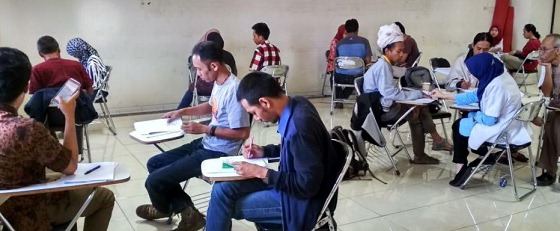|
Cycle 5 (2016 Deadline)
Investigation of services delivered for TB by external care system - especially the private sector (INSTEP)
PI: Bachti Alisjahbana (b.alisjahbana@gmail.com), TB-HIV Research Center, Faculty of Medicine, Universitas Padjadjaran
U.S. Partner: Megan Murray, Harvard Medical School
Project Dates: May 2017 - November 2019
Project Overview:
The PEER project will be comprised of three studies that will cover the whole assessment of services delivered for TB patients in the private sector in Bandung Municipality, Indonesia. The overall study objective is to describe the health care pathways of patients seeking treatment for TB, and describe the behavior, and reasons behind the behavior, of Private Practitioners who diagnose and initiate treatment of TB patients. Specifically, the team will investigate health care pathways of newly diagnosed TB patients according to their socio-demographic characteristics and type of healthcare facility (sub-study 1). The PEER project will also assess the quality of TB case management by private health care providers, including their diagnostic, referral, and treatment practices, by using standardized patients (sub-study 2); and to understand which factors and reasons are associated with the choice of diagnostic, referral and treatment practices among private practitioners (sub-study 3). Cross-sectional, observational, and qualitative study designs will be used to reach the stated objectives.
The study will provide the national TB program a better understanding about the current practices of TB care and management, especially in the private sector. This information is vital since a large proportion of TB cases in Indonesia come to private providers as the first point of care when they first experience sickness. The proposed study method in evaluating the performance of private providers will be different from previous studies conducted in Indonesia by employing an approach which allow the team to investigate real practices performed by private providers.
 | | Standardized Patient Training (Photo courtesy of Dr. Alisjahbana). |
Final Summary of Project Activities
Completed in December 2019, INSTEP was a two year mix method study to assess the services delivered for TB patients in the private sector of Bandung Municipality, Indonesia. Most Indonesian TB patients visit multiple public and private health care sites and suffer significant delays before diagnosis and initiation of treatment. This increases transmission, incurs significant costs, and hampers treatment outcomes and the majority of private practitioners incorrectly managed TB cases. These findings confirm that Indonesian PPs do not adhere to National Tuberculosis Program (NTP) guidelines. The use of chest x-rays as a first diagnostic test may be rational and helpful in the diagnosis of TB and other diseases, but wide prescription of fluoroquinolones can increase drug resistance. Project activities took place under three sub-studies.
A total of 448 TB patients completed interviews in sub-study 1. The study revealed that most patients first visited either private practitioners (36%) or informal providers such as pharmacies (41%). TB diagnosis was mostly made in hospitals (62%), while treatment was mostly provided in primary healthcare centers (40%). One-third of patients (37%) sought care from more than four healthcare providers before diagnosis. The median time was 30 days (IQR 14-61) from the onset of symptoms to visiting a formal healthcare provider, 63 days until TB diagnosis, and 67 days until the start of TB treatment.
In sub-study 2, 12 trained actors were sent to 320 private general practices, 20 private internist and pulmonologist practices, and 30 puskesmas as a comparator. General practitioners correctly managed 32.1% presumptive TB cases, and specialists correctly managed 22.2% presumptive TB cases. In comparison, puskesmas correctly managed 86.7%.. The number of chest x-ray referrals was higher than sputum examination. Incorrect prescription of anti-tuberculosis drugs and/or fluoroquinolones was identified.
In sub-study 3, in-depth interviews revealed that the higher use of x-rays over smear microscopy was due to to the perception that sputum examination has limited sensitivity, patient’s preference, and clinical benefit by excluding other lung abnormalities as underlying reasons. With regard to fluoroquinolone use, patient expectations, absence of TB-specific symptoms, risk of losing patients, and disease severity were mentioned. Low notification rates were attributed to a lack of resources, simplified mechanisms, standard reporting protocol, and knowledge regarding mandatory TB notification.
There is a strong need for better integration of public and private services to help TB control in Indonesia. Re-education and further approaches and strategies are needed to help private practitioners adhere to current tuberculosis management standards and engage in recording and reporting efforts.
Back to PEER Cycle 5 Grant Recipients
|
|
|
|




